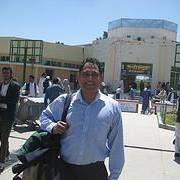"He indicated to his buddies that he had taken out some military-aged males," the senior official said. Soldiers normally use that term to denote insurgents.
But Bales' story soon broke down when commanders on the base learned details of the pre-dawn shooting spree in which 16 Afghan civilians were killed in their homes. At that point, the 38-year-old Army veteran was taken into custody. He refused to talk further and soon asked for a lawyer, two officials said."
Bales' wife has stood steadfastly by her husband, saying that whatever he had done, he loved children and could never harm them.
In 2007 after a battle in Iraq, Bales told the Fort Lewis Northwest Guardian:
"I've never been more proud to be a part of this unit " for the simple fact that we discriminated between the bad guys and the noncombatants," he told the after a battle in Iraq in 2007. "Afterward we ended up helping the people that three or four hours before were trying to kill us."
The Christian Science Monitor reports words from Bales which are startlingly contrary to the charges:
"The charges run contrary to Bales' own words in the 2007 interview with his local newspaper as well, when he expressed disdain for any insurgent would could put "his family in harm's way like that," he said. "I think that's the real difference between being an American as opposed to being a bad guy.""
Publicintellligence.net notes the irony of the current lack of evidence against Bales when forensics against insurgents in Afghanistan are highly developed:
"A presentation from the U.S. Army's Office of the Provost Marshal General indicates that as of August 2011 there were three Joint Expeditionary Forensics Facilities (JEFFs) throughout Afghanistan including one in Kandahar, the same province where Staff Sgt. Bales reportedly committed the massacre. These forensics facilities are capable of DNA analysis, latent print identification, photographic forensics, as well as chemical and ballistic analysis.
-------...it remains to be seen whether the U.S. military will present the same level of forensic evidence that it routinely collects and analyzes when attempting to prosecute suspected insurgents."
The families of the dead have been paid $50,000 for each victim, an extraordinary sum for most Afghans who often take work, when it is available, which pays one dollar a day. The country is the fifth poorest in the world and suffers a 60% rate of child malnutrition, according to Save the Children. Typical victim compensation in cases of civilian deaths is on the order of $2,000.
Dateline SBC interviews with child witnesses
Next Page 1 | 2 | 3 | 4 | 5 | 6 | 7
(Note: You can view every article as one long page if you sign up as an Advocate Member, or higher).





